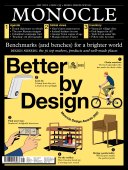
Issue 153
Monocle’s latest issue sets out the benchmarks (and benches) for a better world as we put the 50 recipients of this year’s Monocle Design Awards in the spotlight. Elsewhere, we visit the rugged terrain of northern Norway to witness one of the biggest military drills in Nato’s history and meet the Russian émigrés making Tbilisi their home. Plus: France’s manga obsession.
In This Issue
Oops! No content was found.
Looks like we no longer have content for the page you're on. Perhaps try a search?
Return Home

